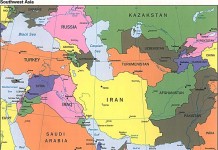Context
 Gaza crisis has erupted once more. Rockets are being fired at Israeli cities, just like in 2012, 2009 and 2006, and the Israeli ground offensive is now underway as well. Heavy civilian causalities are being reported as a consequence of the continuous Gaza bombardment. But the question is how is the present Israeli operation, named Protective Edge, different than the 2012 operation Pillar of Defense, and the Israeli-Lebanon/Hezbollah war of 2006.
Gaza crisis has erupted once more. Rockets are being fired at Israeli cities, just like in 2012, 2009 and 2006, and the Israeli ground offensive is now underway as well. Heavy civilian causalities are being reported as a consequence of the continuous Gaza bombardment. But the question is how is the present Israeli operation, named Protective Edge, different than the 2012 operation Pillar of Defense, and the Israeli-Lebanon/Hezbollah war of 2006.
There are three major observations:
1. The tussles between Shia-Sunni state and non-state actors
2. The global powers engaging Iran in talks over its nuclear program
3. The alignment of interests between Sunni regional states and Israel
While the present crisis seems to be a repeat of the past, geopolitical situation of the region is much different. The Arabs are deeply divided; the Middle East Peace Process lies in stalemate with US withdrawn from its role of the primary interlocutor. Moreover, the emergence of the Palestinian unity government, represented by Hamas and Fatah, is perceived as quite threatening by Israel. The most important variation, however, is that Iran is for the first time engaged in negotiations with the global powers (P5+1). Lastly, Hezbollah has other war theaters to worry about, mainly Syria and Iraq, than to get involved with Israel.
Analysis
Tussles of Shia and Sunni State, Non-State Actors
The underlying theme in the whole Middle East affair is the surging influence of Iran and its proxy, Hezbollah, over Iraq and Syria. While the West is fighting a war against the Sunni non-state actors, the Shia non-state actors are playing a dual role; firstly by countering Sunni extremists and secondly by enhancing Iranian influence.
While the rise of Iran and its proxies is threatening towards Israel in the long run, it also has a positive impact in the short term. Israel benefits when the attention of major regional players is not focused towards it. Nothing accomplishes this more than the Shia-Sunni state and non-state struggles.
Hezbollah is already engaged in saving the Assad regime in Syria and is also thinking of getting involved in Iraq. In this environment, it would hardly want to get entangled with Israel. Similarly, the Sunni non-state actors are also not yearning to shift their focus away from diminishing the influence of Iran and its proxies in the region.
This may represent an opportunity for Israel to deal with Hamas when the Arabs, Iranians and the Turks, are distracted by IS (formerly ISIS) threat, and the conflict of Syria and Iraq.
Last time Gaza erupted in 2012, and Lebanon in 2006, the West had not yet engaged Iran in negotiations over its nuclear program, and the regional Sunni and Shia non-state actors were not as influential as they are today.
Iran Engaged
For the first time negotiations have helped engage Iran while creating leverage for the West. Now Iran has to seriously prioritize its interests and evaluate if it is more important to achieve a permanent nuclear deal and normalization of ties with the West. Or, will it continue with activities in Syria, and in support of Hezbollah and Hamas that are considered highly detrimental. From western perspective, Iran’s cooperation and constructive role in these areas, including in Iraq, can be highly conducive in achieving peace between Israel and Palestine.
Where differences still exist on reaching a final deal, the reason the talks have been extended beyond July 20th is probably because engagement with Iran is already helping to control its behavior and influence vis-à-vis various regional flashpoints. However, this approach requires managing anxieties of Israel and Sunni Arab nations.
Iran’s budding detente with the West also tilts matters in its favor, which is perceived as a dangerous turn of events by the Sunni Arab states, and by Israel as well. The approach adopted by US towards Arab Spring afflicted nations, especially Egypt, and against military strikes against Syria, has furthered paranoia in Arab capitals.
Arab-Israeli Alignment of Interests
In short, and ironically, there is synergy of interest between the regional Sunni Arab States and Israel. They both support Fatah over Hamas, the secular set up in Egypt, reversal of Iran’s regional resurgence and its endeavor towards acquiring nuclear weapons.



